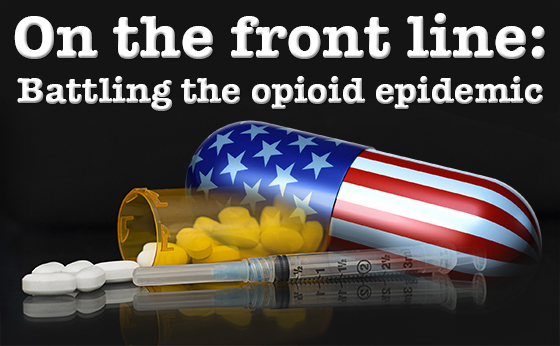|
November – December 2018
A roundup of news and information
 Trump signs opioids law at White House event Trump signs opioids law at White House event
President Donald Trump signed sweeping opioids legislation into law at the White House Oct. 24, CNN* reported. The event marked a year since he declared the opioid crisis a national public health emergency. The bill signed includes provisions aimed at promoting research to find new drugs for pain management that will not be addictive and expands access to treatment for substance use disorders for Medicaid patients.
Drug overdose deaths falling nationwide
The estimated number of deaths from drug overdoses has fallen for each of the last seven months on record nationwide, giving reason for cautious optimism about the state of the country’s substance abuse epidemic, Time magazine reported Oct. 23. Fatal overdoes rates have risen sharply over the past several decades but preliminary data from the Centers for Disease Control and Prevention suggests a modest downturn.
Michigan opioid overdose deaths reach record high last year
The Detroit Free Press* reported Oct. 4 that overdose deaths from opioids reached a record high in Michigan last year, according to a new report released by the Michigan Department of Health and Human Services. The report says that 1,941 of the last year's 2,729 overdose deaths were opioid-related, an increase of 9 percent over 2016. The number represents a slowing of the year-over-year increase in opioid-related deaths. Between 2015 and 2016, opioid overdose deaths jumped 35 percent.
Opioids before joint replacement tied to worse recovery
Prolonged use of opioid painkillers before total knee or hip replacement may greatly increase a patient’s risk of repeat surgery and hospitalization, according to a new study in the Journal of Bone & Joint Surgery, HealthDay® News* reported. Hospital readmission rates in the knee replacement group were 1.4 percent higher among those who used painkillers for more than 60 days and 2.2 percent higher within the hip replacement group.
CDC releases study on opioid use disorder in labor and delivery
The Centers for Disease Control and Prevention recently released the first multi-state analysis of trends* in opioid use disorder in labor and delivery. The analysis indicated that the number of pregnant women with OUD at labor and delivery more than quadrupled from 1999 through 2014, with significant increases in every one of the 28 states with available data. For more information, see the CDC’s graphic,* which highlights strategies to address opioid use disorder and improve maternal and infant health.
Blue plans working together to improve addiction treatment
Blue Cross Blue Shield of Michigan is working with doctors and other experts nationwide to make sure our members have access to the most effective addiction treatment centers to get the care they need. A new Blue Cross Blue Shield Association program, which will include a new designation for effective treatment programs, builds upon the existing Blue Distinction® programs that identify the high-quality doctors and hospitals. For more information, see the MI Blues Perspectives blog.
Study: Nearly 30 percent of opioid prescriptions lack clear clinical explanation
A study published in the Annals of Internal Medicine found that 28.5 percent of opioid prescriptions written in the U.S. between 2006 and 2015 lacked a documented clinical reason, USA Today* reported. The findings, based on analysis of data from the National Ambulatory Medical Care Survey, showed 66 percent of opioid prescriptions were for noncancer pain while 5 percent were intended to treat cancer-related pain.
GDAHC recognizes Michigan OPEN for health care leadership
The Greater Detroit Area Health Council recognized Michigan Opioid Prescribing and Engagement Network with the Eagle Award for Visionary Leadership. The award recognizes the contributions of an organization in Southeast Michigan that has made steady progress in advancing health care quality, access or cost. Michigan OPEN, along with other leaders in health care, was honored Nov. 8 at the 2018 Salute to Healthcare celebration. For information about Michigan OPEN initiatives, visit Michigan-open.org.*
*Blue Cross Blue Shield of Michigan doesn’t own or control this website. |


 Trump signs opioids law at White House event
Trump signs opioids law at White House event